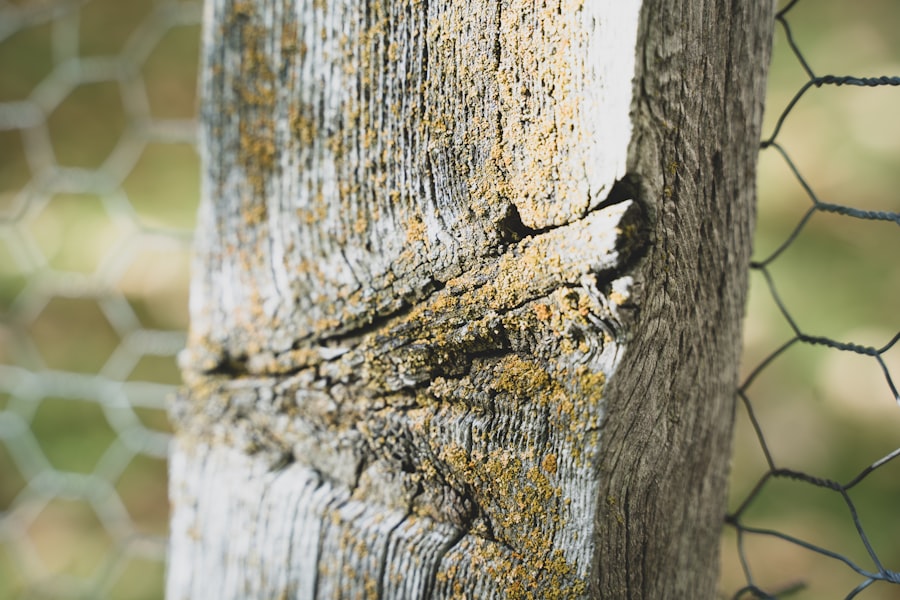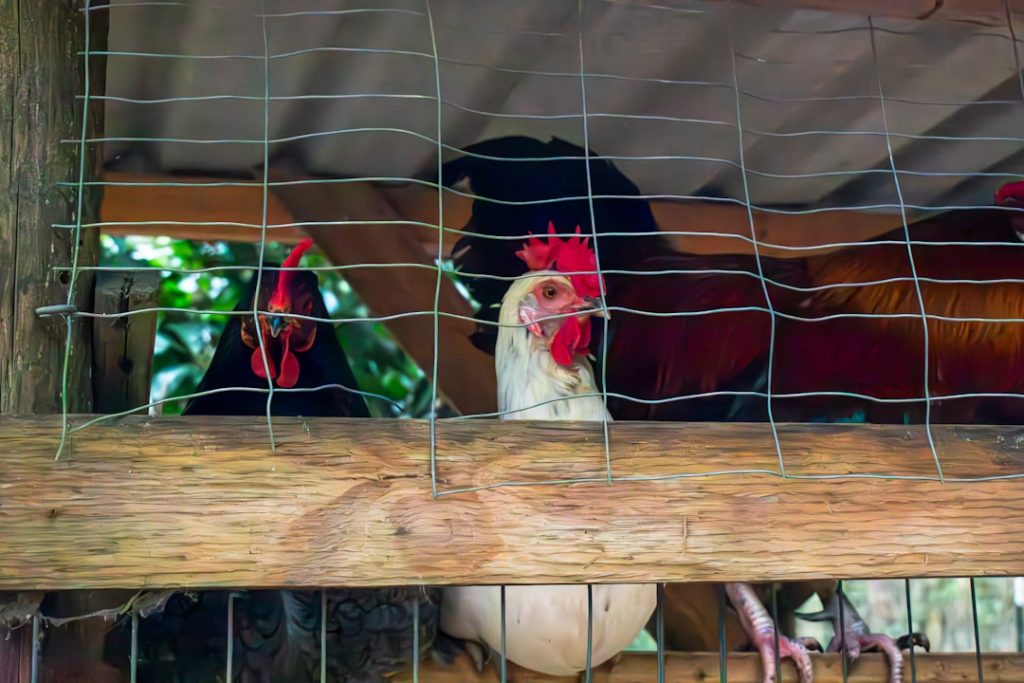Fencing is a critical element in ensuring the safety and security of chickens. As natural foragers, chickens may wander into hazardous areas if not properly contained. A well-constructed fence serves as a physical barrier, preventing predators from accessing the flock and keeping chickens within designated safe zones.
This containment also helps establish clear boundaries for the birds, potentially reducing territorial conflicts and aggressive behavior within the flock. The protective role of fencing extends beyond simple containment. It is instrumental in safeguarding chickens from various threats, including predators, pests, and diseases.
Predatory animals such as foxes, raccoons, and raptors pose significant risks to free-ranging chickens, but a robust fence can effectively deter these threats. Additionally, proper fencing can impede the access of pests like rats and snakes to the chicken coop, thereby minimizing the risk of disease transmission and infestations. In summary, fencing is a fundamental component of chicken husbandry.
It provides a secure and protected environment that is essential for the health, safety, and overall well-being of the flock, allowing chickens to thrive in a controlled and safe setting.
Table of Contents
Key Takeaways
- Fencing is crucial for protecting chickens from predators and keeping them safe.
- Choose durable and predator-resistant materials like welded wire or hardware cloth for chicken fencing.
- Proper installation of fencing is essential to prevent predators from digging under or climbing over.
- Regular maintenance and prompt repairs are necessary to ensure the effectiveness of the fencing.
- Additional security measures such as predator-proof locks and electric fencing can further enhance the safety of chickens.
Choosing the Right Fencing Material
Durable and Predator-Resistant Options
One of the most popular options for chicken fencing is wire mesh, which is available in various gauges and configurations. Wire mesh is durable and provides excellent protection against predators, making it an ideal choice for chicken enclosures. Another option to consider is electric fencing, which delivers a mild shock to predators that come into contact with it, effectively deterring them from attempting to breach the enclosure.
Alternative Fencing Materials
In addition to wire mesh and electric fencing, other materials such as wood, PVC, and netting can also be used for chicken fencing. Wood fencing provides a sturdy and traditional option, while PVC and netting offer lightweight and flexible alternatives.
Choosing the Right Fencing Material
Ultimately, the choice of fencing material will depend on factors such as the size of the enclosure, the specific predator threats in the area, and budget constraints. It is important to select a fencing material that is strong enough to withstand potential threats while also being practical and cost-effective for the specific needs of the chicken coop.
Installing the Fencing Properly

Proper installation of chicken fencing is essential to ensure its effectiveness in protecting the flock. The first step in installing fencing is to carefully plan the layout of the enclosure, taking into account the size and shape of the area, as well as any existing structures or obstacles. Once the layout has been determined, it is important to prepare the ground by clearing away any debris or vegetation that could interfere with the installation process.
Next, the fencing material should be installed securely, ensuring that it is taut and free from gaps or weak points that could be exploited by predators. For wire mesh fencing, it is important to bury the bottom edge several inches into the ground to prevent predators from digging underneath. Electric fencing should be installed according to manufacturer guidelines, with proper grounding and insulation to ensure safety and effectiveness.
Additionally, gates should be installed with secure latches to prevent accidental escape or unauthorized entry. Overall, proper installation of chicken fencing requires careful planning and attention to detail to create a secure and reliable enclosure for the flock. By taking the time to install fencing correctly, chicken owners can provide their birds with a safe and protected environment in which to thrive.
Maintaining and Repairing Fencing
Once chicken fencing has been installed, it is important to regularly maintain and inspect it to ensure its continued effectiveness in protecting the flock. Regular maintenance may include trimming back vegetation that could interfere with the fence, checking for signs of wear or damage, and ensuring that gates and latches are functioning properly. Additionally, it is important to periodically inspect the fence for any signs of intrusion or attempted breaches by predators.
In the event that fencing becomes damaged or compromised, prompt repairs should be made to restore its integrity and security. This may involve patching holes in wire mesh, replacing damaged sections of electric fencing, or reinforcing weak points with additional support. It is important to address any issues with the fencing as soon as they are discovered to prevent potential threats from gaining access to the chicken enclosure.
Overall, regular maintenance and prompt repairs are essential for ensuring that chicken fencing remains effective in protecting the flock from predators and other threats. By staying vigilant and proactive in maintaining and repairing fencing, chicken owners can provide their birds with a secure and safe environment in which to live.
Adding Additional Security Measures
In addition to traditional fencing, there are several additional security measures that can be implemented to further protect chickens from potential threats. One option is to install predator-proofing measures such as hardware cloth or predator aprons around the perimeter of the enclosure. Hardware cloth is a heavy-duty wire mesh that can be buried several inches into the ground to prevent predators from digging underneath the fence.
Predator aprons are wire mesh panels that extend outward from the base of the fence to deter digging predators such as foxes and raccoons. Another security measure to consider is the use of motion-activated lights or sound devices near the chicken coop to deter nocturnal predators. These devices can startle predators and discourage them from approaching the enclosure during the night when chickens are most vulnerable.
Additionally, employing guard animals such as dogs or geese can provide an added layer of protection by alerting to potential threats and deterring predators from approaching the flock. By incorporating additional security measures alongside traditional fencing, chicken owners can create a comprehensive defense system that effectively safeguards their flock from potential threats. These measures can help to minimize the risk of predation and provide chickens with a secure environment in which they can thrive.
Considering Free-Range Options

Benefits of Free-Ranging
Free-ranging chickens have access to a larger area where they can explore, find food, and engage in natural behaviors such as dust bathing and scratching. This approach provides a more natural and enriching environment for the birds.
Risks Associated with Free-Ranging
However, free-ranging also presents certain risks, including predation, disease transmission, and property damage. These risks must be carefully considered and mitigated to ensure the safety and well-being of the flock.
Mitigating Risks with Portable Fencing and Rotational Grazing
To minimize these risks, free-range areas can be enclosed with portable electric netting or poultry fencing that can be moved around to provide fresh foraging opportunities while still offering protection from predators. Additionally, employing rotational grazing practices can help to minimize disease transmission and reduce damage to vegetation by allowing areas to rest and recover between grazing periods.
By carefully considering free-range options and implementing appropriate security measures, chicken owners can strike a balance between freedom and safety for their flock.
Ensuring the Safety and Well-Being of Your Chickens
In conclusion, fencing plays a critical role in ensuring the safety and well-being of chickens by providing a secure enclosure that protects them from predators, pests, and other potential threats. Choosing the right fencing material, installing it properly, maintaining and repairing it as needed, adding additional security measures, and considering free-range options are all important aspects of creating a safe environment for chickens to thrive. By carefully considering these factors and taking proactive steps to protect their flock, chicken owners can provide their birds with a secure and enriching environment in which they can live healthy and happy lives.
Whether utilizing traditional fencing or exploring free-range options, ensuring the safety and well-being of chickens should be a top priority for all poultry enthusiasts. With proper planning and attention to detail, chicken owners can create a secure environment that allows their birds to flourish while minimizing potential risks and threats.
If you’re looking for tips on how to keep your chickens safe and secure, you might want to check out this article on chicken coop nest boxes. It offers valuable information on creating a comfortable and secure environment for your feathered friends.
FAQs
What is fencing to keep chickens in?
Fencing to keep chickens in is a barrier or enclosure designed to prevent chickens from wandering off or being attacked by predators. It is typically made of wire, mesh, or other materials that are difficult for chickens to escape from.
Why is fencing important for keeping chickens in?
Fencing is important for keeping chickens in because it provides a physical barrier that prevents them from wandering into areas where they may be at risk of predation, getting lost, or causing damage to property.
What are the different types of fencing used to keep chickens in?
Common types of fencing used to keep chickens in include chicken wire, hardware cloth, electric fencing, and wooden or metal posts with mesh or wire attached. The choice of fencing depends on factors such as the size of the chicken coop, the terrain, and the predator threat level.
How high should the fencing be to keep chickens in?
The height of the fencing needed to keep chickens in depends on the breed and size of the chickens, as well as the presence of predators in the area. In general, a fence should be at least 6 feet high to prevent most chicken breeds from flying over it.
What are some tips for installing fencing to keep chickens in?
When installing fencing to keep chickens in, it’s important to bury the bottom of the fence at least 6 inches underground to prevent predators from digging underneath. Additionally, regularly inspecting and maintaining the fencing is crucial to ensure its effectiveness in keeping chickens safe.
Meet Walter, the feathered-friend fanatic of Florida! Nestled in the sunshine state, Walter struts through life with his feathered companions, clucking his way to happiness. With a coop that’s fancier than a five-star hotel, he’s the Don Juan of the chicken world. When he’s not teaching his hens to do the cha-cha, you’ll find him in a heated debate with his prized rooster, Sir Clucks-a-Lot. Walter’s poultry passion is no yolk; he’s the sunny-side-up guy you never knew you needed in your flock of friends!







